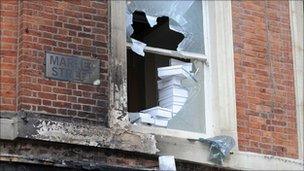England riots: Debate over clean-up costs
- Published

Many businesses were damaged by nights of rioting in English towns and cities
Riot-damaged businesses are claiming for clean-up costs to both their insurers and to a taxpayer backed fund, prompting debate over the final bill.
Some groups say that the use of the Riot Damages Act 1886 is an abuse of public funds, but insurers say it has worked well for years.
A number of English towns and cities were left scarred by nights of rioting, leading to looting of stores.
The government has promised financial support for those affected.
Rebuilding costs
Across the riot hit parts of England, glaziers and shop fitters are working to get businesses back to normal.
The cost of the clean up has been estimated at £200m but there are signs that some insurance firms may seek to recoup the cost of settling claims from the taxpayer-backed fund.
Surveying the wreckage of his Party Superstore shop on Lavender Hill in Clapham, south London, Duncan Mundell estimates that his business faces losses of £750,000.
But the business, which sells party goods and fancy dress items, as well as running the Street Kids Rescue charity raising cash for children in South East Asia, has received enough cash from its insurer to stay afloat.

Duncan Mundell says his business faced losses of thousands of pounds
Mr Mundell said that within 72 hours he had been given an interim payment to help him along.
He said he has been advised by his broker to claim twice for his losses, once through his insurer and secondly under the terms of the 1886 Riot Damages Act.
This piece of Victorian legislation allows businesses to levy claims against individual police authorities and ultimately the Home Office.
This week the Glasgow based loss adjuster Cunningham Lindsey was appointed by the government to act as an intermediary for those businesses seeking claims arising from the recent riots.
Misuse of funds?
The application period for claims has been extended from 14 days to 42.
But the Association of Police Authorities is among those calling for reform of the law, claiming it is a misuse of public funds.
The most recent case of a big payout under the Act followed the arson attack by asylum seekers housed at the Yarls Wood detention centre in Bedfordshire almost a decade ago.
Bedfordshire Police was sued for damages of £43m. At the time, local MP Alastair Burt, told BBC Radio 4's Today programme that the insurer had "found a smart get-out".
But in the industry, brokers and loss adjusters say the fund is helping to keep insurance costs low.
Bill Gloyn, of the insurance risk specialists Jardine Lloyd Thompson, said: "It was salutary that in the aftermath of the 1985 riots in Tottenham there was no increase in premiums because although insurers were able to pay out, in the main they were able to recoup from the compensation fund.''
Both the Federation of Small Business and the Forum of Private Business have flagged the use of the fund as a matter of concern for their members at a time of public spending cuts.
But the Association of British Insurers said the 125-year-old legislation had stood the test of time.
"The industry is working around the clock to help businesses and communities recover from the damage so the police compensation schemes can run effectively," a spokesman said.